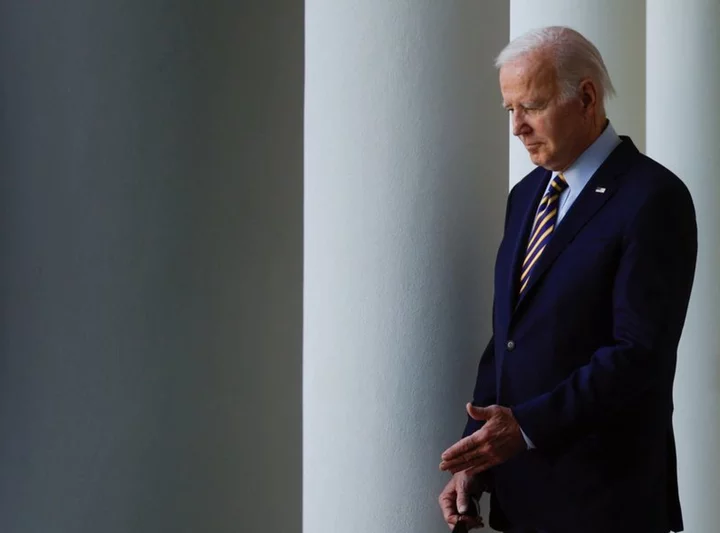By Ann Saphir, Andrea Shalal and Jeff Mason
WASHINGTON (Reuters) -U.S. President Joe Biden on Friday nominated Federal Reserve Governor Philip Jefferson to be the central bank's vice chair, a key policy advisory role recently vacated when Lael Brainard took a top position in Biden's White House economics team.
Biden also nominated the World Bank's U.S. executive director, Adriana Kugler, to be a Fed governor, adding a labor economist to the central bank's leadership ranks as policymakers judge how much further to raise interest rates and cool a strong job market that a number of them, including Chair Jerome Powell, see as aggravating inflation.
The president also renominated Governor Lisa Cook, who joined the Fed at the same time as Jefferson roughly a year ago, to a full 14-year term on the Board of Governors. Her current term expires in January 2024.
"These nominees understand that this job is not a partisan one, but one that plays a critical role in pursuing maximum employment, maintaining price stability, and supervising many of our nation’s financial institutions," Biden said in a statement. "I am confident these nominees will help build upon the historically strong economic recovery we have had under my administration."
A Colombian-American, Kugler would be the first-ever Latina on the Fed Board of Governors, addressing the long-standing complaints of Senator Bob Menendez, an influential Democrat who has decried the historic absence of Hispanics in U.S. central bank leadership. For that reason, Menendez was one of only five Democrats to oppose Biden's reappointment of Powell last year.
"We are finally giving Latinos, all 62 million of us who call this country home, a seat at the table where the most consequential decisions on monetary policy are made," Menendez in a statement, pledging to fight for swift confirmations for all three in the closely divided Senate.
Jefferson, 61, would become the second-ever Black vice chair, the prior being Roger Ferguson who held the post roughly two decades ago.
Jefferson's elevation to the No. 2 spot comes a year into a relatively subdued tenure on the Fed board during which he has offered limited views on monetary policy in the public sphere. He has also voted in favor of each of the eight interest rate increases the Fed has delivered since he joined the seven-member board after an easy Senate confirmation in May 2022.
Cook, 58, the first Black woman to serve on the Fed board, was approved by the Senate a year ago on a narrow 51-50 party line vote. She was a Michigan State University economics professor prior to joining the Fed, and was a senior economist at the Council of Economic Advisers during the administration of President Barack Obama. She, too, has voted in favor of the Fed’s ongoing rate increases.
HISTORIC TIGHTENING NEARS ENDGAME
The nominations to the world's top central bank come as the Fed opens a new chapter in its battle against high inflation.
After just over a year of the steepest round of interest-rate hikes in 40 years, the Fed on May 3 nudged its policy rate to just over 5% and signaled it may be time to take a pause and assess whether any more hikes are needed.
Central bankers want policy tight enough to bring down inflation, now running at more than twice their 2% goal, but not so tight it craters a labor market that so far has weathered the steeper borrowing costs with surprising strength. Finding that balance will be a tricky task.
Meanwhile Biden is in a standoff with Republicans over the debt limit that Treasury Secretary Janet Yellen says could leave the government short of the cash it needs to pay its bills as early as June 1. A default would send the economy into the recession it has so far avoided, analysts say, and do long-term damage to the nation to boot.
CONFIDENCE IN POWELL
The appointment of Jefferson, a PhD economist who has spent most of his career as a college economics professor, marks a departure from a recent run of vice chairs with extensive monetary policy expertise. Brainard, for instance, served as a Fed Board member for eight years before ascending to the No. 2 role. She resigned in February to become director of Biden's National Economic Council.
The move suggests Biden continues to have confidence in Powell's agenda-setting, even as it risks putting some of the historic employment gains under the president's watch at risk with potentially more policy tightening to come, Capital III's Karim Basta said.
The Fed vice chair typically works closely with the Fed chair and the New York Fed president - currently John Williams - as a "troika" who formulate policy options that feed into rate-setting decisions made twice a quarter by the Fed's 19 policymakers.
Of five public appearances to date as Fed governor, Jefferson's speech at the University of Chicago Booth School of Business conference in February gave perhaps the best glimpse into his views, which appear generally in line with Powell's.
Responding to a paper that argued the Fed can't win its inflation fight without sending the economy into recession, Jefferson said today's inflation, driven by the coronavirus pandemic and war in Ukraine, may differ from past episodes, and though it is proving sticky particularly for services outside of the housing sector, a recession may yet be avoidable.
Powell made a similar point on May 3.
The nominations also bring greater diversity to Fed policymaking, not just by race and gender, but also by professional background and area of expertise.
Kugler, 53, is a PhD economist who has researched extensively on U.S. and international labor markets. Biden appointed her last year to her World Bank role, in which she is one of 25 national executive directors at the global development lender.
She also served as chief economist at the U.S. Labor Department from 2011 to 2013 during the Obama administration.
(Reporting by Ann Saphir;Editing by Dan Burns and Andrea Ricci)

